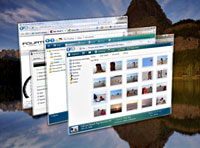 Bill Gates launched Vista this morning by emphasizing the role of the general public in its conception. “We’ve got over 5 million beta testers to thank,” he told a packed audience at the British Library in London. “They’ve helped to make sure that Vista is the highest quality product we’ve ever released. And then we picked 50 families and talked to them about how they used computing in their daily lives, generating over 800 changes in the final version.”
Bill Gates launched Vista this morning by emphasizing the role of the general public in its conception. “We’ve got over 5 million beta testers to thank,” he told a packed audience at the British Library in London. “They’ve helped to make sure that Vista is the highest quality product we’ve ever released. And then we picked 50 families and talked to them about how they used computing in their daily lives, generating over 800 changes in the final version.”
This isn’t the monolithic Microsoft of old, laying down the law and strong-arming others to follow its digital lead. Instead, Gates pointed out that Office 2007 (also launched today) “redefines collaboration in the workplace. It embraces the XML standard and that’s a big deal.” He went on to say that “the strength of Windows has always been the ecosystem around it, consisting of hardware, solutions and software partners. We’ve always had ten times as many applications for Windows as for other operating systems, and that’s allowed us to see software at low prices.”
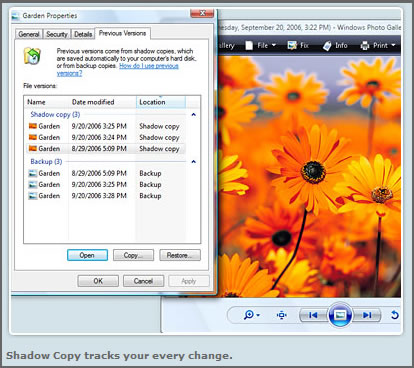
It’s perhaps no coincidence that the Vista ecosystem opens up a whole new environmental niche, in the form of miniature applications called Gadgets, a selection of which were unveiled (at great length) by Windows marketeers. Although superficially very similar to Apple’s desktop Widgets, the Gadgets on show were heavily branded by partners ranging from BetFair to Universal Music, and seemed to integrate worryingly easily with Microsoft’s software. If you block out a meeting in Milan, for instance, the EasyJet Gadget could pop up to suggest suitable flights.
It remains to be seen whether Gadget developers have consumer – rather than corporate – interests uppermost in their minds. Bill gushed: “I’m excited to see what people are going to do with Vista”. Any bets that malware Gadgets are just around the corner?
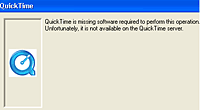 So I’m being bombarded by Apple’s super-expensive advert campaign telling me how great Macs are and how only dull business nerds bother with PCs.
So I’m being bombarded by Apple’s super-expensive advert campaign telling me how great Macs are and how only dull business nerds bother with PCs.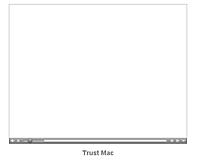 PC users are represented as dull business bores who wouldn’t know what fun is if it French-kissed them in the buttocks, while Mac users are seen to be spontaneous, fun-loving bon viveurs, hurtling along the highway of creativity at reckless speeds.
PC users are represented as dull business bores who wouldn’t know what fun is if it French-kissed them in the buttocks, while Mac users are seen to be spontaneous, fun-loving bon viveurs, hurtling along the highway of creativity at reckless speeds.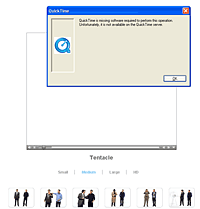 “Fair enough,” I think to myself, confident of a slick, smooth, user-friendly solution coming along.
“Fair enough,” I think to myself, confident of a slick, smooth, user-friendly solution coming along.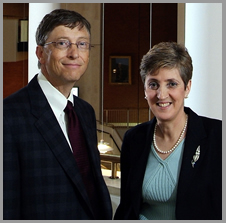 Two notebooks containing work by Leonardo da Vinci, know as the Codices, have been digitally reunited today at the launch of Windows Vista.
Two notebooks containing work by Leonardo da Vinci, know as the Codices, have been digitally reunited today at the launch of Windows Vista.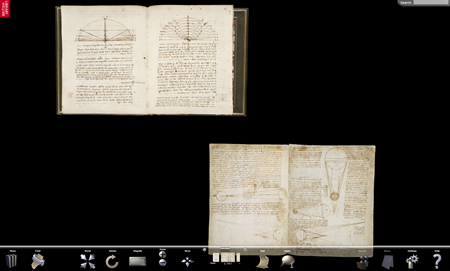
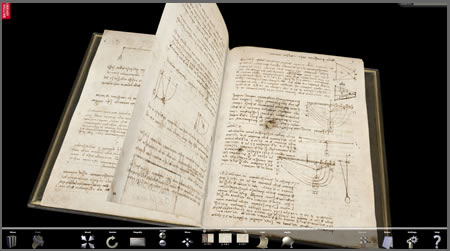
 They started at 4am, pegging 2,500 sheets of paper in the grass of a park to form a giant eye – the pun being that Australia was also watching the world.
They started at 4am, pegging 2,500 sheets of paper in the grass of a park to form a giant eye – the pun being that Australia was also watching the world.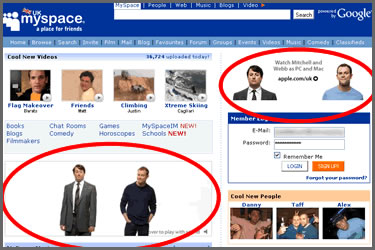 Apple must be spending large on this as it’s all over the UK MySpace pages, with double ads showing on a lot of the pages.
Apple must be spending large on this as it’s all over the UK MySpace pages, with double ads showing on a lot of the pages. New figures from research firm Epitiro puts BT as the leading consumer broadband provider for the 4th quarter of 2006 (October-January).
New figures from research firm Epitiro puts BT as the leading consumer broadband provider for the 4th quarter of 2006 (October-January).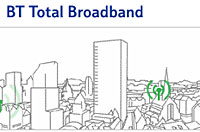 Epitiro’s testing procedure monitors “customer experience” for internet access services, analysing over 622,000 real-time data samples from eleven locations around the UK – meaning that each broadband service was tested around 60,000 times.
Epitiro’s testing procedure monitors “customer experience” for internet access services, analysing over 622,000 real-time data samples from eleven locations around the UK – meaning that each broadband service was tested around 60,000 times. “Speeds have increased from 3817.82 kilobytes per second in the third quarter due to new ADSL Max entrants into the ten largest broadband providers. However it’s unlikely that many ADSL Max services will perform at their full capacity of 8Mbps. The speed of broadband service reduces the further the customer’s connection is from their local telephone exchange,” he added.
“Speeds have increased from 3817.82 kilobytes per second in the third quarter due to new ADSL Max entrants into the ten largest broadband providers. However it’s unlikely that many ADSL Max services will perform at their full capacity of 8Mbps. The speed of broadband service reduces the further the customer’s connection is from their local telephone exchange,” he added.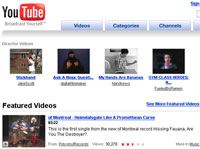 Filmmakers who upload their own movies on to the video-sharing website YouTube will soon be able to enjoy some financial rewards for their efforts.
Filmmakers who upload their own movies on to the video-sharing website YouTube will soon be able to enjoy some financial rewards for their efforts.

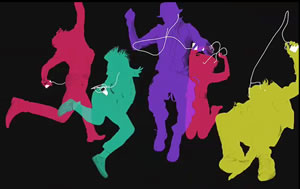 Norway has declared iTunes to be illegal because it doesn’t allow songs downloaded from the online music store to be played on any other equipment except their own, today’s FT reported.
Norway has declared iTunes to be illegal because it doesn’t allow songs downloaded from the online music store to be played on any other equipment except their own, today’s FT reported.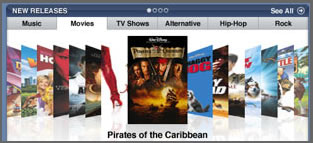 The original complaint was made by Torgeir Waterhouse, senior advisor to the Norwegian Consumer Council. He told the FT that “he was in negotiations with pan_European consumer groups to present a unified position on iTunes’ legality.”
The original complaint was made by Torgeir Waterhouse, senior advisor to the Norwegian Consumer Council. He told the FT that “he was in negotiations with pan_European consumer groups to present a unified position on iTunes’ legality.”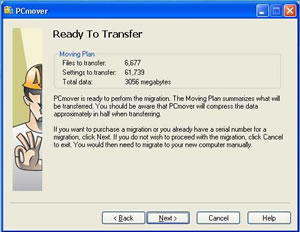 Getting a new machine with a new operating system is both a joy and a pain. The joy is the shiny new OS you have to play with and the likelihood that it runs considerably faster than the previous machine. The pain, is trying to make sure you’ve remembered all of the little bits of data tucked away in forgotten corners, and usually having to reconfigure all of your settings back to the way you had them on your previous machine.
Getting a new machine with a new operating system is both a joy and a pain. The joy is the shiny new OS you have to play with and the likelihood that it runs considerably faster than the previous machine. The pain, is trying to make sure you’ve remembered all of the little bits of data tucked away in forgotten corners, and usually having to reconfigure all of your settings back to the way you had them on your previous machine.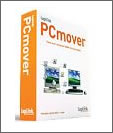 Beyond this, you can choose from a wired/wireless network for top speed, or resort to a USB 1.1 or a parallel cable. There’s also an option to use removable media such as a CD-R or DVD-R.
Beyond this, you can choose from a wired/wireless network for top speed, or resort to a USB 1.1 or a parallel cable. There’s also an option to use removable media such as a CD-R or DVD-R. They’ve been compiling stats on this using
They’ve been compiling stats on this using 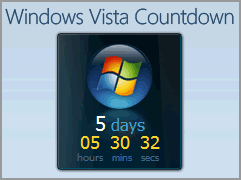 The real figure of pirated copies is likely to be far higher than the 22.3% figure quoted, as it’s only the innocent/daft who would let their computer tell Microsoft that they are using a piece a software they bought from the bloke at the car boot sale for a fiver.
The real figure of pirated copies is likely to be far higher than the 22.3% figure quoted, as it’s only the innocent/daft who would let their computer tell Microsoft that they are using a piece a software they bought from the bloke at the car boot sale for a fiver.